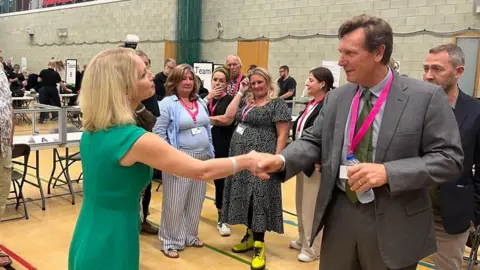Plymouth rejects directly-elected mayor
 BBC
BBCPeople in Plymouth have rejected a directly-elected city mayor model in a referendum.
Leaders of the campaign against the introduction of a city mayor said the people of Plymouth "knew better" and the city was "on the up", as Plymouth Council said turnout was 19.1%.
Even if there had been a vote for a city mayor, the government had previously stepped in to postpone any election until May 2027 and said it would scrap the introduction of any new directly-elected city mayors before then.
Angus Forbes, the millionaire Australian businessman who funded the campaign for a mayor, said "democracy has been trampled on" and that many people in Plymouth thought the referendum had been cancelled.
Under a directly-elected mayor system the council would have been run by the mayor, rather than the current system where the council is run by the leader, an elected councillor chosen by other councillors.
The referendum was triggered by a petition with more than 10,000 signatures calling for change.

Nearly 200,000 people were eligible to vote and Plymouth City Council said the turnout was 19.11%.
Charlotte Holloway, a Labour councillor and one of the co-organisers of the Plymouth Knows Better campaign against a directly-elected mayor, said: "Plymouth really does know better.
"People saw straight through this failed, costly experiment and they made that known at the ballot box.
"This referendum was always a waste of time and public money. Voter turnout was one of the lowest Plymouth has ever seen - not because people didn't care, but because they knew it was pointless."
'Frustration'
Forbes, who is married to former Strictly Come Dancing judge Darcey Bussell, said: "Democracy was absolutely trampled on - let's make that absolutely clear.
"When you have intervention and frustration by Westminster as aggressive as it was - a lot of Plymothians thought this was cancelled."
The businessman said his campaign had "come very close" and he was proud of what he described as "a grassroots initiative".
The city mayor referendum in Plymouth was completely separate from the moves towards introducing more strategic mayors around the country, like those that exist in Greater Manchester and the West Midlands.
As part of its local government reorganisation the government is abolishing district and county councils in favour of unitary authorities.
Those unitary authorities are then expected to work together as strategic authorities with directly-elected mayors who would have increased powers in areas such as planning and transport.
Councils in Devon said at first they would like to create a strategic authority with Cornwall but councillors in Cornwall rejected that possibility.
Follow BBC Devon on X, Facebook and Instagram. Send your story ideas to [email protected].
